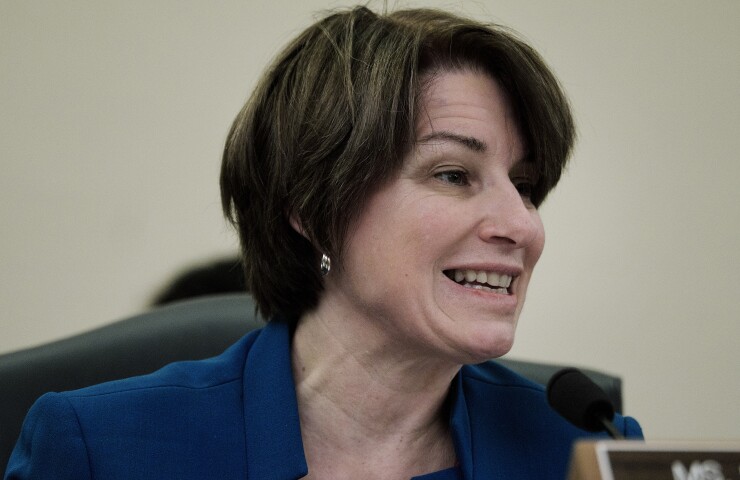DALLAS -- President Trump’s $1 trillion infrastructure program, now expected to be unveiled this summer, could move smoothly through Congress if the president and lawmakers can find common ground on how to fund the expected $200 billion of direct federal spending in the measure, Sen. Amy Klobuchar, D-Minn., told a transportation gathering on Monday.
Administration officials have said the details of the plan would become available in May, in the fall, or in 2018 but Transportation Secretary Elaine Chao over the weekend said the plan would be made public this summer.
“We're on track,” Chao told the Boston Globe. "There's a great deal of discussion over the most difficult part of the initiative, which is funding it."
Presidential press secretary Sean Spicer said at Monday’s news briefing that infrastructure is not the administration’s top priority at this point.
“I think we seem to have our hands full right now with healthcare and tax reform," Spicer said.
The president “is obviously still committed to infrastructure, something he's talked about a lot in terms of roads and bridges and rebuilding things,” Spicer said. “It’s something that both sides of the aisle and both chambers probably agree on. We’ll have further details on that moving forward."
Klobuchar said she was surprised that the $1 trillion, 10-year infrastructure plan was not the administration’s first proposal to Congress.
“There’s a lot of momentum for infrastructure funding right now, and the president is going to have to decide,” she said at the Politico Live event. “I would list this as the top thing he could get done if he wants to go for it.”

Reform of the international tax code could provide much of the revenue needed for the $200 billion of direct federal funding expected to be in the plan, Klobuchar said.
“The debate is going to be about the funding,” she said. “We should have done that before healthcare.”
Additional revenues resulting from tax reform should be dedicated to infrastructure spending, Klobuchar said.
Sen. Deb Fischer, R-Neb., said she had expected an infrastructure proposal from the Trump administration but not until 2018.
“I didn’t expect infrastructure to come up this year but it’s nice to hear that discussion taking place,” she told the transportation advocates, reporters, and others at Monday’s event.
“It’s going to happen, and the president should reach out to Democrats and Republicans alike,” Fischer said. “Infrastructure is very expensive. Figuring out how to pay for a $1 trillion plan is quite the undertaking.”
The popular support for more infrastructure spending is an opportunity for lawmakers to find a sustainable revenue source for the Highway Trust Fund, said Ed Mortimer, executive director of transportation infrastructure at the U.S. Chamber of Commerce.
“We’ve been talking about it for years,” he said. “This is a once in a lifetime opportunity and the business community is not going to let this go by.”
The gas tax should be increased but it is not a sustainable source for the HTF as vehicles become more fuel-efficient, Mortimer said at Monday’s event.
“There are no magic bullets,” he said. “Vehicle-miles-traveled might be a long-term solution, but it won’t happen in the next 10 years.”
Tolls will play a major role in road funding because federal and state resources are not sufficient for the Trump plan or the similar proposal from Senate Democrats, Moody’s Investors Service said in a report issued Monday.
“While detailed funding proposals for new projects are not yet developed, given constraints on existing federal and state funding options, both plans will likely require a dedicated revenue source and so we expect tolling to figure prominently,” said Maria Matesanz, a senior vice president at Moody’s and author of the report.
Senate Democrats in late January proposed their own 10-year infrastructure with $1 trillion of direct federal funding. The plan, which did not specify a funding source, included $210 billion for roads, $180 billion for rail and transit, and a $200 billion vital infrastructure fund for major projects.
“We expect no significant increase in federal funding given the lack of political will in recent years and the depleted state of the Highway Trust Fund,” she said.





